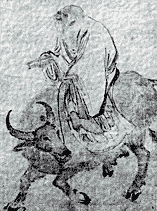
![]() Lao Tzu was the ancient Chinese philosopher who wrote the Tao Te Ching more than 2,500 years ago. The name is an honorific title, meaning “Old Master.” Its two characters have been spelled in many different ways depending on the romanization system used. Some possibilities are as below:
Lao Tzu was the ancient Chinese philosopher who wrote the Tao Te Ching more than 2,500 years ago. The name is an honorific title, meaning “Old Master.” Its two characters have been spelled in many different ways depending on the romanization system used. Some possibilities are as below:
- Lao Tze
- Lao Tse
- Lao Tsu
Also depending on the system, there may or may not be a dash between the two words, and the second word may or may not be capitalized.
In the future, all the above variations will be unified by the Pinyin romanization system into one standard: Laozi. For now, the important thing to keep in mind is that no matter how the name is written, it refers to one person — the author of the Tao Te Ching.
Some Western authors assert that the name “Lao Tzu” has another meaning that can be translated as something like “Old Son” or “Ancient Child.” This is absolutely incorrect.
Historical documents tell us the person behind the Lao Tzu title was a man by the name of Li Er. Legend has it that King Wu of Zhou appointed him Head Librarian of the royal archives at Luoyang. In that capacity, Li Er dealt with numerous ancient scrolls and manuscripts. He was able to immerse himself in the study of history, philosophy and literature, gaining understanding and insights along the way. In time, he won much acclaim for the wisdom he had cultivated — and thereby his honorific title, the Old Master.
According to another legend, Confucius visited with Lao Tzu and came away in awe of his wisdom. Confucius recognized in Lao Tzu a deep understanding about the world that was well beyond his own, and went so far as to liken Lao Tzu to the mysterious dragon. Many in later generations would regard Confucius as Lao Tzu’s disciple.
Lao Tzu decided to leave civilization behind when the House of Zhao began its decline. He departed Luoyang and headed for the Hangu Pass, intending to go far beyond it to some destination in the West.
While at Hangu Pass, Lao Tzu was recognized by the commander, who was a student of the Tao. He realized immediately that Lao Tzu’s departure would mean a great loss to all who wished to further their studies, so he asked Lao Tzu to write down a summary of his teachings for posterity. Lao Tzu agreed, and wrote a small book in two parts, expressing his accumulated learnings in brief, concise yet profound language. The first part became known as the Tao Ching, meaning Tao Classic; the second part was the Te Ching, meaning Virtue Classic. Together, the two parts form Tao Te Ching, the Tao and Virtue Classic.
- The Sad Lady - December 1, 2019
- Purchasing Yi - December 1, 2019
- The Seven Virtues of Water - August 21, 2018
